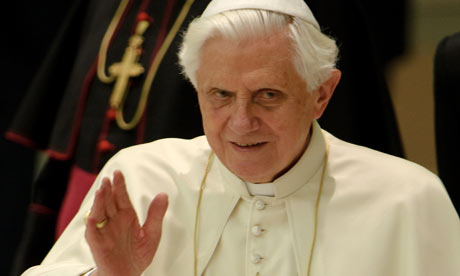Benedict XVI's Spokesman, Father Federico Lombardi, Suggests 'Tenacious' Plot to Implicate Pontiff in Cover-Up
By John Hooper
Guardian
March 13, 2010
http://www.guardian.co.uk/world/2010/mar/13/vatican-defends-pope-munich-abuse
VATICAN CITY -- The pope's spokesman has launched a vigorous counter-attack against a report linking Benedict XVI to a sex abuse cover-up while he was archbishop of Munich from 1977 to 1981.
Father Federico Lombardi appeared to suggest in an interview on Vatican Radio that the pope, who also has strong links to the city of Regensburg, was the victim of a plot.
 |
| Pope Benedict XVI has said he was 'shocked' to hear of the Munich sex abuse case. Other church officials have taken responsibility for letting the abuser strike again. Photo by Vincenzo Pinto |
"It's rather clear that in recent days there have been people who have searched – with notable tenacity – in Regensburg and Munich for elements to personally involve the holy father in the question of the abuses," Lombardi said. "To any objective observer it's clear that these attempts have failed."
The Vatican has been appalled in recent days by a flood of allegations of priestly sex abuse in Germany, Holland, Austria and even Italy.
Today, the pope's former diocese rushed out a statement to pre-empt a story in tomorrow's edition of the Munich-based daily Süddeutsche Zeitung. It said that when Joseph Ratzinger was the city's archbishop he had agreed that a priest from another diocese should undergo therapy at a rectory. The records suggested that "it was known then that this therapy should probably be carried out due to sexual relations with children". But instead of sending him for therapy, the statement said, the diocese's then vicar-general, Gerhard Gruber, assigned him to a parish where at least one child was subsequently abused.
"Gruber takes full responsibility for the wrong decisions," the diocese said.
The church's attempt to bury the affair was immediately challenged by the Survivors Network of those Abused by Priests, which tomorrow is holding "sidewalk vigils" in more than 30 US cities in support of European victims. David Clohessy, the network's national director, said: "As a high-ranking church official for decades, if Ratzinger knew of one reassigned paedophile priest, the odds are he knows of others, possibly dozens. German secular authorities should do in Munich what Irish secular authorities did in Dublin: launch a thorough secular probe of clergy sex crimes and cover-ups."
The latest front was opened in Austria where two newspapers reported cases of abuse among choirboys in Fügen and Vienna. Today a newspaper in the predominantly German-speaking Italian province of Bolzano-Bozen recounted the story of a then 15-year-old boy who said that in the 1960s he was coerced into providing sexual services to local friars.
The growing scandal has also put Catholic leaders under siege elsewhere in Europe. Bishops in the Netherlands are looking into more than 200 suspected cases, and in Germany at least 170 former pupils at Catholic schools have made accusations. Another case concerns an all-boys choir in Regensburg, the Domspatzen, once conducted by the pope's brother, Georg Ratzinger. The reported sex abuse dates from before his 30-year tenure as director.
The scandals have set off an unprecedented public debate among church leaders on one of Roman Catholicism's strongest taboos – whether the paedophilia in its ranks is a consequence of priestly celibacy. On Friday, Benedict himself vigorously defended an unmarried priesthood, telling an audience of priests that it was not something to be given up for "passing cultural fashions". But one of his own prelates, Hans-Jochen Jaschke, said in a radio interview: "The celibate lifestyle can attract people who have an abnormal sexuality and cannot integrate sexuality into their lives."
Priestly celibacy is a discipline, rather than a doctrine, and most of the Eastern rites of the Catholic church follow the practice of the Orthodox in allowing for married priests; the pope could do away with celibacy at any time. The Italian daily La Repubblica reported that a Vatican working group had been set up secretly to consider reform, but said no change was likely for at least 50 years.
The Vatican's own newspaper, meanwhile, added to the debate. In an article in L'Osservatore Romano, Catholic academic Lucetta Scaraffia linked the scandals to the lack of women in pastoral and decision-making roles in the church. She said a more significant female presence "could have ripped away the veil of male omertà" that had covered up abuse.
On Friday, the head of the German bishops' conference, Archbishop Robert Zollitsch, briefed the pope on measures being taken by his archdiocese to deal with clerical sex abuse. But, as a German lay group noted, the pope did not take the opportunity to express sympathy with victims, and doubts remained as to how many of his pastors understand the gravity of the situation. The day before, one of the bishops closest to Benedict, Gerhard Müller, declared that the scandal was over "cases from 40, 50 years ago" that had been blown out of proportion by "a big media clamour".
He lashed out at Germany's justice minister, Sabine Leutheusser-Schnarrenberger, who had talked of a Catholic wall of secrecy. Müller said she belonged to a humanist association which he claimed was a kind of "masonry" that "considers paedophilia normal and wants to decriminalise it". Müller, who founded the institute that is publishing Benedict's complete works, is also the prelate charged with probing abuses in the Domspatzen choir.
Any original material on these pages is copyright © BishopAccountability.org 2004. Reproduce freely with attribution.